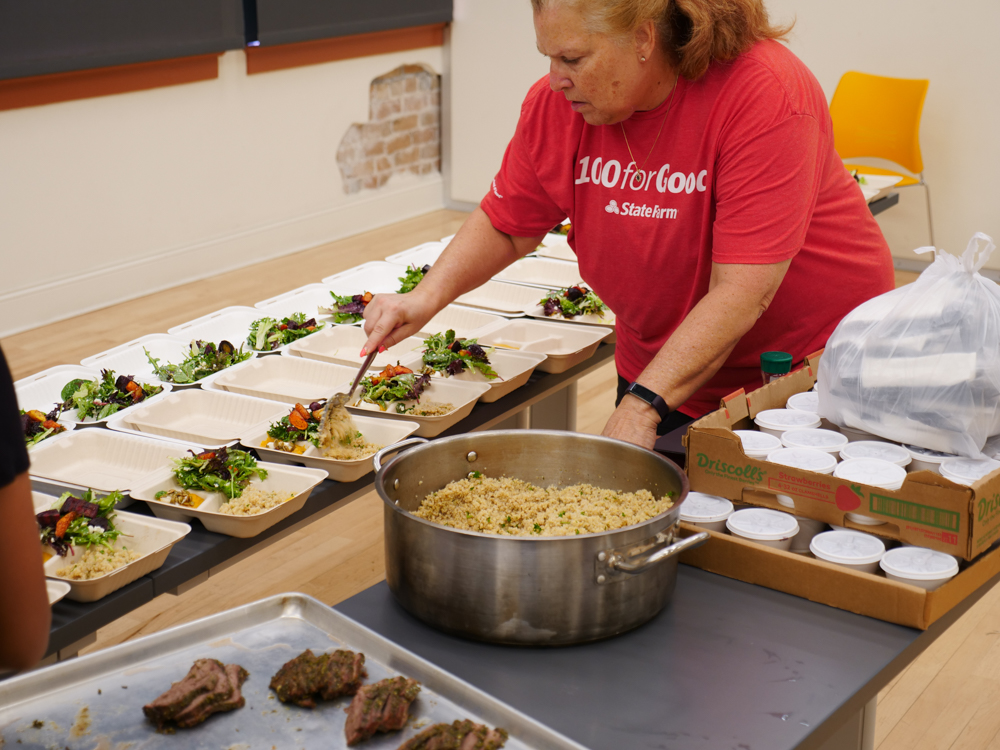apartmentApply to Osborn Pointe! Learn more about this 55+ community in Phoenix - NOW LEASING!

Native American Connections applied for and was awarded $120,000 from Local Initiatives Service Committee-Phoenix to participate in the national Funds to Feed grant program. Over the past eight months we've expended those funds with two goals: first, to provide meals and food supplies to fixed / low-income individuals and families; second, to support local, Indigenous, small businesses which faced serious economic setbacks from the pandemic. We accomplished both!
We invite you to read more below and visit NAC's new TikTok account for a short video of our Funds to Feed activity. Click here to view video!
Brad Firethunder, chef/owner of Phoenix Eats prepared and delivered 800 Thanksgiving dinners, and 800 Christmas dinners to families living in five different NAV low-income housing communities in Phoenix.
Maria Parra Cano, chef of record at the Phoenix Indian School Visitors Center and owner of Sana Sana Foods, prepared 40 meals each week for 10 weeks, February – April, for our Senior Living, fixed income Phoenix site.
Nephi Craig, Executive Chef of Café Gozhoo in Whiteriver AZ, offered four sessions at NAC’s Substance Use / Transitional Living sites in Phoenix. His presentations, lectures, demonstrations were focused on healthy foods, easy preparations, and eating for wellness. He taught, prepared, and served a total of 85 individuals in recovery on those four occasions.
NAC collaborated with Partnerships with Native Americans who hired Indigenous chefs for their ‘Train the Trainer’ program aspect of the grant. They recruited ‘student cooks’ for eight teaching sessions over five months, taught by Nephi Craig, Bleu Adams, Felicia Cocotzin Ruiz, Tyrone Thompson, among others and prepared a total of 620 meals which State Farm Volunteers delivered to NAC’s five fixed / low-income sites in Phoenix.
In support of Arizona agriculture, NAC, purchased from Green-on-Purpose locally grown and harvested produce, and 250 10-lb bags of heirloom Guatemalan roasted coffee beans from Tonatierra. The produce was bagged into 1,435 separate 10-lb packages sent to 9 different Phoenix destinations for families from February through June. Those packages provided the ingredients for many, many meals.
Each and every one of those events/deliveries help supplement families’ pantries during a difficult time of rising costs and provided fresh ingredients for health and well-being.
Our traditions are the foundation of our organization - explore, learn, and utilize resources available for all.

Get the support you need with health, housing, and community services available at Native American Connections.

Your support changes lives and builds healthy communities. Find ways to get involved.

A "chronically homeless" individual is defined to mean a homeless individual with a disability who lives either in a place not meant for human habitation, a safe haven, or in an emergency shelter or in an institutional care facility if the individual has been living in the facility for fewer than ninety (90) days and had been living in a place not meant for human habitation, a safe haven or in an emergency shelter immediately before entering the institutional care facility. In order to meet the ‘‘chronically homeless’’ definition, the individual also must have been living as described above continuously for at least twelve (12) months or on at least four (4) separate occasions in the last three (3) years, where the combined occasions total a length of time of at least twelve (12) months. Each period separating the occasions must include at least seven (7) nights of living in a situation other than a place not meant for human habitation, in an emergency shelter or in a safe haven.
Federal nondiscrimination laws define a person with a disability to include any (1) individual with a physical or mental impairment that substantially limits one or more major life activities; (2) individual with a record of such impairment; or (3) individual who is regarded as having such an impairment. In general, a physical or mental impairment includes, but is not limited to, examples of conditions such as orthopedic, visual, speech and hearing impairments, cerebral palsy, autism, epilepsy, muscular dystrophy, multiple sclerosis, cancer, heart disease, diabetes, Human Immunodeficiency Virus (HIV), developmental disabilities, mental illness, drug addiction, and alcoholism.